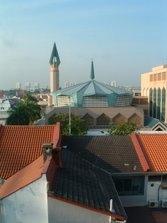
Take advantage of the extended period of 'Explore Singapore' promotion with free City Tour, Internet Access and Buffet Breakfast included at Grand Mercure Roxy Singapore, Novotel Singapore Clarke Quay and ibis Singapore on Bencoolen.
Singapore (PRWEB) January 14, 2010 -- Accor Hotels in Singapore - a European leader in hotels and tourism, extends the ongoing 'Explore Singapore' promotion to March, 31 2010 for stays until 30 April 2010. Starting from SGD143++ (USD105++), the promotion offers quality accommodations at great locations in Singapore and additional benefits including free buffet breakfast, 1-day unlimited open-top bus city tour, unlimited Internet access and much more.
Due to popular demand, Accor's Explore Singapore promotion has been extended. The campaign, which involves all Accor hotels in Singapore including Grand Mercure Roxy Singapore, Novotel Singapore Clarke Quay and ibis Singapore on Bencoolen, have generated significant interest among both leisure and corporate travelers visiting Singapore. Over 4,000 room nights have already been booked in less than a month promotion period and the bookings are still growing.
Visitors staying at Grand Mercure Roxy Singapore, Novotel Singapore Clarke Quay and ibis Singapore on Bencoolen under the Explore Singapore promotion will enjoy great benefits with room rate starting from SGD143++ (USD105++) a night, inclusive of free city tour, buffet breakfast and unlimited Internet access.
Incorporating a special complimentary one-day unlimited open-top bus city tour, guests taking advantage of the Explore Singapore promotion will have a chance to experience more than 20 tourist attractions at the leisure of your own pace. Visit popular places like Botanic Gardens, Chinatown, Chjimes, Merlion Park, Orchard Road, River Cruise, Singapore Flyer and etc. with accompanied tour guide who will ensure hopping on and off the bus is a delightful adventure.
EXPLORE SINGAPORE Promotion also includes:
* One night stay at your choice of hotels
* Daily buffet breakfast
* One-day unlimited city tour
* Free internet access
* Enjoy original authentic bumboat ride for only just S$8 (Usual Price: S$13)
* 10% discount for Singapore Flyer ticket
* Free drink at Hard Rock Café + discounted coupon
* Free drink at Manchester United Café Bar in Boat Quay
Select your choice of hotels:
* Grand Mercure Roxy Singapore from SGD148++ (USD109++), the hotel also provides complimentary airport transfer.
* Novotel Singapore Clarke Quay from SGD188++ (USD138++), the hotel is strategically located in the heart of the city.
* ibis Singapore on Bencoolen from SGD143++ (USD105++), the hotel is recently voted the ‘Best Budget Hotel 2009' by TTG.
This offer is valid for stays from now to 30 April 2010, perfect for both leisure and business travelers visiting Singapore for Asian Sports Hub & Tourism Conference, Singapore Air Show and experience Chinese New Year in Singapore. Take advantage of this offer and book online at "www.explore-singapore.com.sg" before 31 March 2010.
Terms and Conditions apply. Promotion offer is subject to room availability and may not be available during hotel's peak periods. Price shown may differ due to daily currency exchange rate.
About Grand Mercure Roxy Singapore
Grand Mercure Roxy is an ideal hotel for a business trip or holiday in Singapore. Amidst the heritage charms of historic Katong, the hotel enjoys easy access to the city centre, Singapore Expo, the Suntec Convention Centre and Orchard Road. Enjoy fantastic shopping at the nearby Parkway Parade or a great day out at East Coast Park with beaches, recreational facilities and renowned seafood restaurants. 15 minutes from Changi Airport with complimentary shuttle service.
About Novotel Singapore Clarke Quay
Located in the vibrant and dynamic Clarke Quay area, Novotel Clarke Quay is well known for its breath-taking view of the Singapore River. The hotel is minutes away from the Central Business District and shopping malls with easily accessible public transports reaching out to other parts of Singapore. Featuring 401 recently renovated rooms and modern amenities, this 4-star hotel is a perfect choice for both leisure and business travelers.
About ibis Singapore on Bencoolen
Easily reached by public transportation, ibis on Bencoolen is conveniently located within the cultural, shopping and business districts. Don't be misled by the price tag, the hotel is the premier choice among budget conscious travelers who still demand international service standards.
About Accor
Accor, a major global group and the European leader in hotels, as well as the global leader in services to corporate clients and public institutions, operates in nearly 100 countries with 150,000 employees. It offers to its clients over 40 years of expertise in two core businesses:
- Hotels, with the Sofitel, Pullman, MGallery, Novotel, Mercure, Suitehotel, ibis, all seasons, Etap Hotel, Formule 1 and Motel 6 brands, representing 4,000 hotels and nearly 500,000 rooms in 90 countries, as well as strategically related activities, such as Lenôtre;
- Services, with 30 million people in 40 countries benefiting from Accor Services products in employee and public benefits, rewards and loyalty, and expense management.
Source









